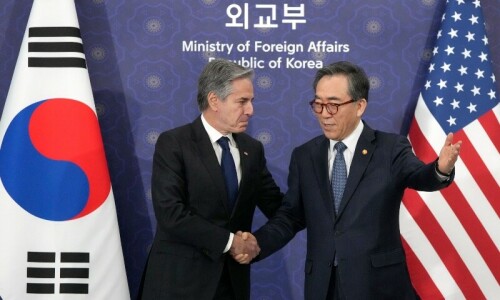WASHINGTON: The United States has had it two ways for years in the Middle East: Funding and defending authoritarian regimes while encouraging some political dissent and condemning human rights abuses by the governments it considers crucial partners in an unstable region.
That disconnect explains why no U.S. official has given full-throated support to the popular unrest rippling across the Middle East this week. Leaders from President Barack Obama down have noted the help the United States gets from Egypt, in particular, while urging reform on that country’s ruler for the past three decades, President Hosni Mubarak.
“Egypt’s been an ally of ours on a lot of critical issues,” Obama said in a YouTube interview on Thursday. “Mubarak has been very helpful on a range of tough issues,” Obama said, adding that he has argued to Mubarak that political and economic reform “is absolutely critical to the long-term well-being of Egypt.”
“You can see these pent-up frustrations that are being displayed on the streets,” Obama said.
From Tunisia to Egypt to Yemen, the Obama administration’s immediate interests are stability and cooperation in counter-terror operations and Israeli-Palestinian peace talks. Long-term US interests are helping to introduce greater democracy and open up the region’s markets.
That is the same calculus that faced George W. Bush’s administration, which irritated Egypt with a “freedom agenda” but maintained close military, intelligence and diplomatic ties and disappointed democracy activists in the end.
Now the United States is struggling to come up with a regional strategy that acknowledges the thirst for change and incorporates the differences in each of the countries now in flux.
“People are watching what has happened in Tunisia, country by country, population by population; they’re drawing lessons from what is happening,” State Department spokesman P.J. Crowley said Thursday.
Crowley said the protests should be allowed to continue, but he added that “change can happen in a stable environment.”
The US response has grown slightly bolder as the protests have spread, but it remains cautious.
Secretary of State Hillary Rodham Clinton shifted from voicing her belief in the stability of Egypt’s government to more forceful calls for reform. She was on the phone Thursday with Egypt’s longtime foreign minister to encourage “restraint and dialogue,” a State Department Twitter feed said.
White House spokesman Robert Gibbs sidestepped an opportunity on Wednesday to reaffirm directly US backing for Mubarak.
“The administration has been caught off guard, but then the entire world has been caught off guard,” said Robert Danin, a senior fellow at the Council on Foreign Relations and a State Department specialist on the Middle East under Bush. “We have a crisis and US near-term interests and long-term interests are in conflict. The administration is trying to balance these.”
The opposition suddenly on display from Tunis to Cairo and beyond represents a confusing mix of ideologies and agendas.
In Tunisia, activists are struggling with the remnants of their deposed leader’s regime to steer a democratic path.
Any Egyptian transition would be complicated by Islamic hard-liners who now have backed the revolution but whose views on Israeli-Palestinian peace and other topics run completely counter to US plans.
“This clearly isn’t a coherent opposition rising up and trying to seize power,” said Jon Alterman, Mideast director at the Center for Strategic and International Studies.
While some experts have attached partial blame on the Obama administration’s engagement policy, the US government is working in a very narrow space.
Criticism too sharp of a close ally such as Mubarak could undermine him; overly vociferous support for the same government could empower harsher crackdowns on pro-democracy activists.
“As a friend, we’re offering our advice to Egypt, but what they do is up to them,” Crowley said.
A blind push for democracy also could hamper US interests in countries with wide support for hard-line Islamic extremists. Limits to the Bush administration’s hopes for a wave of democratic revolutions in North Africa and the Middle East were clearly seen with Hamas’ 2006 electoral victory in Palestinian elections.
It also does little to help in Lebanon, where Hezbollah has used parliamentary procedure to emerge as the dominant force.
“Elections can be very disruptive because sometimes authoritative governments are more understanding to the United States than democratic ones,” Alterman said. “When societies change, no one can steer that change, neither the governments inside nor the ones outside.”









































Dear visitor, the comments section is undergoing an overhaul and will return soon.